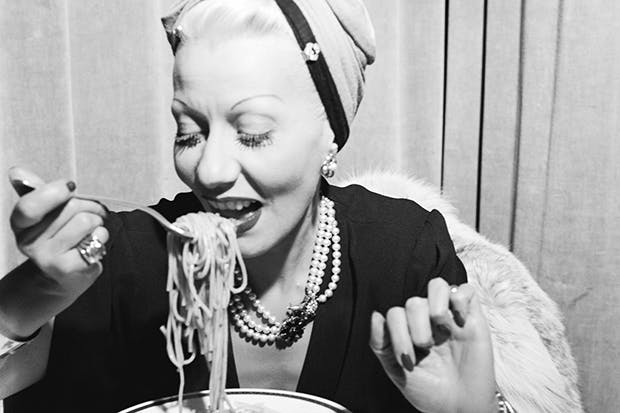A few months ago, Nigerian migrants housed at a government hostel in Milan suddenly refused to eat any more of the free food on offer. Italian food is monotonous and indigestable, they explained. Then they went berserk.
This was not a one-off case. Far from it. There have been hunger strikes, demos, sit-ins and the odd riot in protest at the stuff. Recently, a group of mainly Pakistani migrants based in a Reggio Emilia hostel were given their own taxpayer-funded chef ‘specializzato in piatti pachistani e africani’. They had complained that Italian food was making them ill.
Many migrants en route from Libya to who-knows-where are marooned in Italy for now, and they are getting fed up. They know that other EU countries have better food. It is the pasta, apparently, that really gets their goat. Such news outrages the touchy Italians: to insult free food is bad enough; to insult free Italian food is blasphemy.
I think it is very funny. It is partly the irony of destitute Africans turning up their noses at food revered in civilised circles around the world. But after two decades of living in Italy, I also have a few issues with the way they do things. So anything that challenges the validity of the core myths of their culture makes me laugh.
The Italians howl ‘force them to eat pork’ and ‘ship them back to eat lizards and scorpions’, but those Nigerians, whether Muslim or Christian, told the naked truth. ‘Gimme five!’ I felt like shouting.
Maybe Italian restaurants in Notting Hill or Little Italy are fantastic. I have no idea. But so boring are Italian restaurants in Italy that I gave up going to them years ago. With a few exceptions, wherever you go the menu is identical and the standard mediocre. What about Tuscany, which is only a stone’s throw away across the Apennines as the crow flies? Surely the food is fantastic in Chiantishire? No, actually, not as far as I can tell.
Food was never a way of life for me in the way that booze was, but I used to love dining out. That was until I came to Italy. Here, the restaurants fill me with so much ennui that once inside one I feel as if I am in an existentialist novel. The trouble starts with the lighting, which is invariably too harsh. I am at a loss to explain this Nazi-style illumination. All that occurs to me is that Italy is so riddled with dishonesty and back-stabbing that the Italians need to keep a close eye on each other at all times.
Moving on to the menu, there is little point looking at it except to avoid offending the staff because it is always the same: identical antipasti (starters), primi (pasta), secondi (meat/fish) and dolci (desserts). And if the place is also a pizzeria, the same pizze.
And while Italy is almost completely surrounded by sea, you might as well be in the Sahara. It is near impossible to find fresh fish caught by real fisherman. Aside from sea bass or bream from the fish farms or mussels grown on the legs of the offshore gas rigs, everything else is frozen and imported, including cockles, the key ingredient of the staple pasta fish dish: spaghetti alle vongole.
Yes, the primi, usually pasta-based, are fine the first 50 times. But the secondi are always dull: it is either a piece of grilled meat (a fillet steak or a couple of mutton chops), or farmed fish, or else a fry-up of frozen imported calamari, prawns and whitebait. And that’s your lot.
Unlike the French (at least in the good old days), the Italians rarely do interesting main-course sauces. This is probably just as well, because when they do appear they are insipid. They are either red (tomato) or white (cream) and are dispensed torrentially. No Italian restaurant would dare surprise you with the juxta-position, say, of something sweet with something savoury. Too daring, too foreign.
They cannot do potatoes either. Their chips — always frozen — are rubbery, their roast potatoes leathery and their equivalent of mash watery. They regard vegetable contorni (side-dishes) as an irritant which they cook with no enthusiasm, either boiling them to the quick or baking them dry. This helps explain why Emilia-Romagna has one of the highest bowel cancer rates in the world. They have no idea how to make a good salad.
Decent bread exists, but in restaurants it’s usually dry as a bone and light as a feather, or else it’s piadina, which is like pitta. Their desserts are far too sweet and showy. But yes, their ice creams are fantastic, as is the coffee. The wine, as I know only too well, is highly drinkable.
You’d think they could at least get pizza right, but no. Here the fault does not lie with the chefs, but with the owners. Take a simple pizza such as the romana: it will be made with the cheapest possible mozzarella, and then sprinkled with so few anchovies and capers that you need a magnifying glass to find them. When Italy has so many fabulous ingredients and so many world-famous food products, you wonder: how on earth can the restaurants be so unimaginative, so unadventurous, so stultifyingly provincial? The reason why Italians won’t change the menu is that they are blinded by the belief that Italian food was, and remains, the best in the world. To change it, or worse, fuse it with the food of other countries, would be sacrilege.
This explains why there has been no food revolution in Italy, unlike in Britain. And why there are so few foreign restaurants here apart from the odd Chinese and McDonald’s. I could murder a curry, but have no idea where the nearest Indian might be. Traditional English food of the kind described by George Orwell in his 1945 essay ‘In Defence of English Cooking’ is out of the question.
As for the mediocrity, I think that from about 1985 a cynical, penny-pinching arrogance — the negative side of the Italian character — came to dominate at the expense of the positive side: a perfectionist, creative generosity. The big crash in 2008 which, thanks to the euro, has consigned Italy to a state of more or less permanent recession has made things worse.
Yet if I tell the Italians that their food is monotonous and mediocre and that British cooking beats theirs, they urge me ‘inglese di merda’, to ‘just bugger off back to England’. At least I could get a decent meal if I did.






Comments